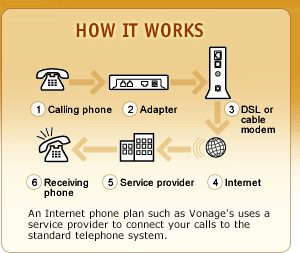 In the last few weeks I've increasingly mentioned several forms of new web-based communication technologies (other than blogs) such as vlogs and podcasting. The leader in today's blog concerns another increasingly common form of web-based communication technology - VoIP - (or, Voice over Internet Protocol) and how VoIP may be set to change our working lives. The following quote from an article by Carol Lewis of The Times summarises how such a revolution may take place:
In the last few weeks I've increasingly mentioned several forms of new web-based communication technologies (other than blogs) such as vlogs and podcasting. The leader in today's blog concerns another increasingly common form of web-based communication technology - VoIP - (or, Voice over Internet Protocol) and how VoIP may be set to change our working lives. The following quote from an article by Carol Lewis of The Times summarises how such a revolution may take place:VoIP gives companies a cheap and easy way to change working practices, including: allowing you to take your office phone number and facilities (directories etc) with you wherever you go; being able to reroute calls, for individuals or entire companies, at the click of a mouse; and enabling call-centre workers to use full call-centre facilities at home (which will help to retain staff who want to work from home and allow call-centre teams to be expanded and contracted depending on demand).
In brief, it would seem that the main benefit, certainly from an employee's point of view, is to increase the opportunity for people to work from home. Whilst it is easy to see how it could work in theory, I also sense that the reality may be quite different and most employees should be wary of being seduced by the opportunity to use cutting edge technology combined with the alleged convinience of home-working.
It may sound cynical to some, but the convinience of VoIP could lead to workers being denied the social rewards of the workplace, being coerced into changing their status from employed to self-employed, and, employees being burdened with the cost of running someone else's business, e.g. it costs serious money to pay for a house these days and setting a room aside for an office should not be underestimated, never mind heating bills, and general wear and tear, etc. There is also a serious need to consider the health and safety requirements of homeworkers, which may not be as easy to keep tabs on as it is to monitor how well an employee may or may not be performing.
Some other articles that have caught my eye recently and relate to new forms of web-based communication include: Will TV get caught up in the web? - looks at how vlogs such as Amanda Congdon's Rocketboom.com could be spawning the broadcasting stars of the future (the Observer). A second article - Site protects rights of snappers - reports on a growing on-line marketplace that is said to provide a commercial exchange market for images on blogs and blog entries too (BBC News). So if you feel that you've got anything of value to sell then visit Spy Media now!
2 comments:
These are new terms to me and I find them interesting but also frightening. Many workers could be taken advantage of in various ways by extending their "workplace" to include home and private time. When one is telecommuting, where is the line between work and home drawn?
I think you hit the nail on the head - new technology is very interesting, yet we must be wary of how it may actually be used. The line between work and home need not be a problem as before industrialisation it was common feature of everyone's life. However, it does become a problem if workers are seduced or even coerced into using certain ways of working and do not have the option of re-negotiating how they work.
Post a Comment